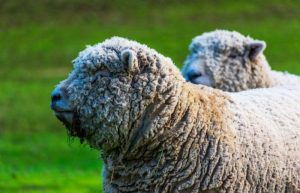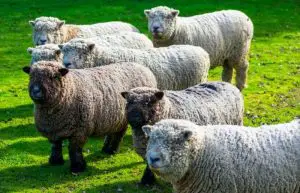
What to Know About Raising Babydoll Sheep
“Babydoll”. When it comes to the name of a breed of sheep, is there any sweeter name than this? But what about the breed’s disposition and personality – do Babydoll Sheep make good pets? Many of us who have had experience with smaller, or “mini” versions of standard companion animals know that small in stature does not equal gentle in nature. Ever been around a feisty Chihuahua, or a miniature horse mare for that matter?
Do Babydoll Sheep make good pets? Fortunately in this case of raising miniature animals, the answer is yes – Babydoll Sheep make terrific companions. They are docile in temperament, and easy to train. An added bonus is their smaller more manageable size which makes them great pets for a family or young kids.
Read on to learn more about this charming breed, including how and where it originated from, its physical characteristics, and what makes it a great companion choice.
What Makes the Babydoll Sheep a Great Pet?
Babydoll Sheep are known for their docile and calm temperament. It has been said that Babydolls bring a soothing presence to a farm, and can calm other livestock that they are with. For this reason, partnered with its small stature and lack of horns, the Babydoll is a popular choice of sheep for 4-H and FFA.
Babydoll Sheep Personality
Many people who raise Babydoll Sheep say that they appreciate the distinctive personalities that the breed displays. Whether a bossy ringleader, a shy attentive mother, or an affectionate and outgoing companion, each Babydoll has its own unique, distinctive personality that they are happy to show you.
Babydoll Sheep are known as the breed of sheep that is an excellent companion to both children and the elderly. It is at an advantage in this department because of its manageable size, but the main reason the Babydoll is known to be such a great companion is because of its winning personality. The Babydoll is respectful, calm, and not at all aggressive.
Babydoll Sheep Are Respectful
Babydoll Sheep are not escape artists. Because of their shorter stature, they are not climbers and are not comfortable standing on their hind legs. They are also naturally respectful of boundaries – they are not known to challenge fences and are not prone to wandering. Anyone who has had an escape artist living in (and out) of their pasture will know first-hand the importance of this quality.
Of course, this quality does not mean that you can skimp on fencing. While the Babydoll will likely not attempt to take down (or go over) your fence, predators will have no such qualms about attempting to break in. The Babydoll is small, polled, and meaty – and will certainly be tempting to any large predators that live in your area.
Babydoll Sheep Are A Healthy, Hardy Breed
Because the Babydoll is a very old breed, they are not prone to many of the health problems that plague modern sheep. They are known to live for approximately 15 to 16 years. They have also shown to be resistant to foot rot and parasites. This is an excellent attribute when raising and caring for livestock and should not be under-emphasized.
Though the Babydoll is a naturally healthy breed, they will need to be cared for like any other breed of sheep – this includes regular worming, vaccinations, hoof trimming, and of course, annual shearing.
Babydoll Sheep are also hardy when it comes to climate. They are comfortable in the cold Winters, and can also handle the heat of Summer. Of course, shelter is a must, as it is with any animal. A 3-sided shelter works best for the Babydoll Sheep; a structure in which they can escape the rain, and a shady spot to rest during the hotter weather.
Babydoll Sheep are Excellent Gardeners
Do you have a vineyard and you are unsure if sheep are compatible with your plants? How about a fruit or berry orchard? Babydoll Sheep are famously kept in commercial, organic vineyards and orchards for the following reasons:
Babydoll Sheep are organic weed control. They are too short to reach up and harm the plants and fruit, and instead are very efficient weed-eating machines, mowing the surrounding ground to a healthy, attractive landscape.
Babydoll Sheep provide fertilizer. Of course, all of those weeds have to go somewhere, and are processed in the Babydoll’s efficient gastrointestinal system and exit the other end as beneficial, organic fertilizer for your plants. What better system than one that organically removes weeds and provides rich nutrients to your plants?
Babydoll Sheep eat fallen fruit. Some of the fruit on your vines and trees will naturally fall to the ground before they can be harvested. Babydolls will eat that fruit so that you do not have to worry about the fruit rotting on the ground and inviting all sorts of pests (which may then invade your healthy plants).
Babydoll Sheep are Excellent Mothers
The gentleness and stability of the Babydoll Sheep make them excellent mothers. They are also successful mothers, usually birthing twins, and often triplets. This is a good quality if you are interested in breeding your Babydoll.
Important Notes to Keep In Mind When Keeping Babydoll Sheep as Pets
 Strong Flocking Instinct
Strong Flocking Instinct
Babydoll Sheep are known for their strong flocking instinct. All sheep are happiest when in a herd of some size or form, however Babydoll are particularly attached to their flock. For this reason, never plan to raise a single Babydoll. If you are just starting your flock, always purchase more than one lamb (or adult). If you find yourself needing to separate a ram to control breeding among your flock of Babydolls, consider keeping the ram with a wether (a neutered male) as a companion for him.
Take Care with Other Livestock
Because of their gentle nature and diminutive size, special care must be taken with other livestock. It is not advised to keep Babydoll sheep with intact Llamas or Alpacas, who may try to mate with your ewes.
As with any herd, flock, or pack – take additional precautions when introducing your sheep to your existing livestock and/or pets. It is always a good idea to introduce new animals slowly, especially when the new one may be in danger of being injured by the existing animals. It may help to add your new Babydoll(s) into the pasture in a removable pen – this way your new pets can “live with” the rest of the residents, and vice versa, without any physical interaction. After they seem to be used to one another, you can remove the portable pen and let them mingle (under supervision in the beginning).
To learn more about keeping sheep with alpacas, check out my article Can Alpacas Be Kept With Sheep?
History of the Babydoll Sheep
“Babydoll Sheep” is a shorter way of referring to the Olde English Babydoll Southdown Sheep breed. As its full name suggests, the Babydoll is derived from the Southdown Sheep. The Southdown Sheep is believed to have originated in the late 1700’s, from the Southern hills of England, known as the “South Downs” (is there any wonder where the Southdown got its name?).
In 1803, the Southdown Sheep was imported into the United States, where there was an appetite for larger cuts of meat. Because of this preference, the Southdown was bred to be larger, taller, and heftier. This resulted in what we now refer to as the Southdown sheep – a breed of sheep that reaches a weight of 150 – 230 pounds, used mainly for meat.
In 1986, a man named Robert Mock set out to restore the original Southdown’s breed standards. After years of searching for (and then breeding) the original Southdown, he distinguished this breed from its newer, larger descendents by calling it the “Olde English Babydoll Southdown”. This new (old?) breed has since surged in popularity, and for good reason – read on to learn more about the attributes of the Babydoll.
Physical Characteristics of the Babydoll Sheep
Babydoll Sheep typically stand 18” – 24” in height at the (shorn) shoulders when mature, and will weigh between 60 and 125 pounds. Both ewes and rams are polled (hornless), and their bodies are longer than they are tall. To learn more, check out my article How Big Do Babydoll Sheep Get? What You Need to Know.
A nickname for the Babydoll Sheep is the “Teddy Bear Sheep”. This comes from the wide, level face that gives the Babydoll its teddy bear-like appearance. Babydoll Sheep are also known to appear to be smiling, often called the “sheep that smiles”.
There are two recognized colors of the Olde English Babydoll Southdown – off-white, and black. The white coloring is more common in the Babydoll, with an off-white body and a tan, mouse-colored face.
Most popularly kept as pets, Babydoll Sheep have other uses as well. Relative to their size, Babydoll Sheep have substantial and tender carcasses, making them an excellent choice for meat. Babydoll Sheep also have very fine wool, at 19 – 22 microns, which puts it in the class of Cashmere.
Are You Ready to Add Babydoll Sheep to Your Family?
With their teddy bear face and winning smile, their miniature stature, and their gentle, unique personalities, it’s no wonder Babydoll Sheep are gaining popularity as pasture pets. They are an excellent choice of sheep breed – whether you are looking to sell wool, raise your own meat, or simply sit outside and enjoy them.
Want to learn more about how to care for sheep? Visit my article How To Care For Sheep: Essential Guide For Beginners.
